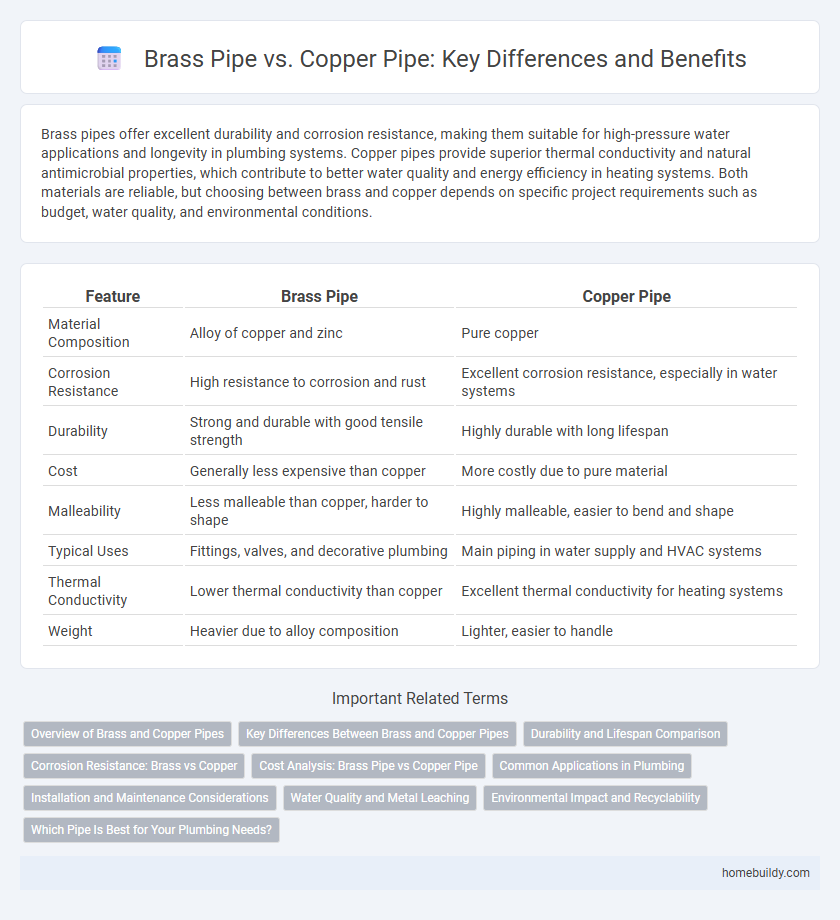Brass pipes offer excellent durability and corrosion resistance, making them suitable for high-pressure water applications and longevity in plumbing systems. Copper pipes provide superior thermal conductivity and natural antimicrobial properties, which contribute to better water quality and energy efficiency in heating systems. Both materials are reliable, but choosing between brass and copper depends on specific project requirements such as budget, water quality, and environmental conditions.
Table of Comparison
| Feature | Brass Pipe | Copper Pipe |
|---|---|---|
| Material Composition | Alloy of copper and zinc | Pure copper |
| Corrosion Resistance | High resistance to corrosion and rust | Excellent corrosion resistance, especially in water systems |
| Durability | Strong and durable with good tensile strength | Highly durable with long lifespan |
| Cost | Generally less expensive than copper | More costly due to pure material |
| Malleability | Less malleable than copper, harder to shape | Highly malleable, easier to bend and shape |
| Typical Uses | Fittings, valves, and decorative plumbing | Main piping in water supply and HVAC systems |
| Thermal Conductivity | Lower thermal conductivity than copper | Excellent thermal conductivity for heating systems |
| Weight | Heavier due to alloy composition | Lighter, easier to handle |
Overview of Brass and Copper Pipes
Brass pipes are alloyed from copper and zinc, offering high corrosion resistance and excellent machinability, making them suitable for plumbing systems requiring durability and flexibility. Copper pipes provide superior thermal conductivity and antimicrobial properties, commonly used in residential water supply lines due to their reliability and ease of installation. Both materials resist rust but differ in cost and specific application advantages within plumbing infrastructure.
Key Differences Between Brass and Copper Pipes
Brass pipes, composed mainly of copper and zinc, offer higher corrosion resistance and greater durability compared to pure copper pipes, making them ideal for industrial applications where strength is crucial. Copper pipes provide superior thermal conductivity and are typically easier to bend, which suits them well for residential plumbing and HVAC systems. Key differences include brass pipes' enhanced resistance to dezincification and copper pipes' natural antimicrobial properties.
Durability and Lifespan Comparison
Brass pipes offer superior durability due to their corrosion resistance and ability to withstand high temperatures, making them ideal for harsh environments and long-term plumbing systems. Copper pipes, while also durable and resistant to corrosion, typically have a slightly shorter lifespan, averaging around 50 years compared to brass pipes that can last over 70 years under similar conditions. The robust composition of brass pipes contributes to enhanced longevity, especially in systems exposed to water with higher acidity or mineral content.
Corrosion Resistance: Brass vs Copper
Brass pipes exhibit superior corrosion resistance compared to copper pipes due to their alloy composition, which includes zinc and other metals enhancing durability in various water conditions. Copper pipes are prone to oxidation and can develop patina or greenish deposits over time, especially in acidic or highly chlorinated water. The enhanced corrosion resistance of brass makes it a preferred choice for plumbing systems exposed to harsh environments or aggressive water chemistry.
Cost Analysis: Brass Pipe vs Copper Pipe
Brass pipes generally cost more than copper pipes due to their alloy composition, which includes zinc and other metals, increasing production expenses. Copper pipes are often favored for cost-effective plumbing solutions because of their lower raw material and manufacturing costs. When considering long-term investment, brass pipes may provide enhanced durability and corrosion resistance, potentially offsetting the initial higher price through reduced maintenance and replacement needs.
Common Applications in Plumbing
Brass pipes are commonly used for water supply lines, gas lines, and fittings due to their corrosion resistance and durability in high-pressure environments. Copper pipes are widely preferred for potable water systems and HVAC applications because of their excellent thermal conductivity and antimicrobial properties. Both materials excel in residential and commercial plumbing, with brass often chosen for fittings and valves, while copper is favored for piping that requires flexibility and ease of installation.
Installation and Maintenance Considerations
Brass pipes offer easier installation due to their flexibility and lower risk of cracking under pressure, making them suitable for tight spaces. Copper pipes require careful soldering and are more prone to damage during handling, demanding skilled labor for installation. For maintenance, brass pipes resist corrosion and develop a protective patina, reducing upkeep, while copper pipes may need more frequent inspection for corrosion and pinhole leaks.
Water Quality and Metal Leaching
Brass pipes contain a mixture of copper and zinc along with trace amounts of lead, which can leach into drinking water, potentially impacting water quality and posing health risks. Copper pipes offer superior corrosion resistance and minimal metal leaching, maintaining higher water purity and safety standards. Water quality tests often favor copper pipes due to their lower metal ion release, especially in acidic or soft water conditions.
Environmental Impact and Recyclability
Brass pipes, composed primarily of copper and zinc, offer high recyclability with a significant portion of their material typically reclaimed and reused, reducing landfill waste and conserving natural resources. Copper pipes are highly sustainable due to their excellent recyclability, as nearly 100% of copper can be recovered and repurposed without losing quality, making copper an environmentally friendly choice for plumbing systems. The extraction and production processes for both brass and copper involve environmental impacts, but the long lifecycle and high recyclability of these metals contribute to their overall lower environmental footprint compared to plastic alternatives.
Which Pipe Is Best for Your Plumbing Needs?
Brass pipes offer superior durability and corrosion resistance, making them ideal for long-lasting plumbing systems, especially in high-pressure applications. Copper pipes provide excellent thermal conductivity and are highly resistant to bacteria, suitable for both hot and cold water supply lines. Choosing between brass and copper depends on factors like budget, water quality, and specific plumbing requirements.
Brass pipe vs Copper pipe Infographic

 homebuildy.com
homebuildy.com